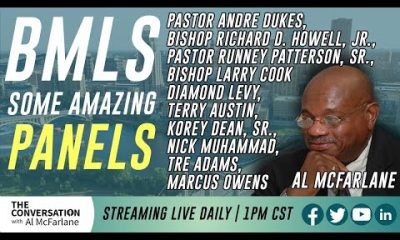Commentary
COMMENTARY: For profit prisons
NASHVILLE PRIDE — Private for-profit prisons are a contentious reality that many feel may have a lingering detrimental effect on people.
Private for-profit prisons are a contentious reality that many feel may have a lingering detrimental effect on people, especially African Americans and people of color undergoing adjudication that may lead to incarceration in this country. It may be surprising how the public as a whole is not enraged and seeking to correct this practice. It is arguably a conflict of interest and can be considered an insult as well as a travesty of injustice for anyone who advocates for true equality and justice.
We have two types of prison systems. First, we have public prisons and jails run by local, state, and federal government—supported and run with taxpayer‘s money. This system, therefore, offers more public transparency and accountability. Then we have private for-profit run prisons contracted as a third party with the expectations of saving the system money. In the process of saving money, corners are cut. Thus you may find little accountability or transparency in the documentation, minimal rehabilitation, less security, fewer employees, compromised medical care, and more violent assaults among inmates and with staff occurring.
The largest private prison company in this country is CCA (Corrections Corporation of America) now called Core Civics located in Nashville Tennessee. It is rarely publicly criticized as a problematic entity and is considered a good company to invest in. Privately contracted prisons originally came about to help handle the surplus of those being sent to jail for drug-related crimes. The main argument for contracting prisons to private operations was to save money.
The Bureau of Justice Statistics’ last report stated that seven percent of state prisons were privately run, while 18% of federal prisons were privately contracted out. There are some who would argue that privately run prisons do not present a problem since the majority of prisons are publically run.
Make no mistake: if a private for-profit prison is a business, one can conclude that making money is the main objective and bodies are needed to meet that goal. It is not too hard to understand that justice may be compromised by subtly granting longer sentences that unfairly target various groups of people. This argument may have some credibility when considering that contracts granted to private prisons are based upon the percentage of beds being filled and longer amount of time of incarceration.
Let’s not rationalize. We know that it is morally wrong to capitalize on someone’s misfortune, especially if fairness for all is questionable or if outcomes are advantageous to private, self-serving parties. Unfortunately, but true, justice many times tends to play favorites, depending on what side of the spectrum one falls. Race, economic status, and whom you may know are some of the major factors impeding impartial treatment for all.
No one is questioning the need for prisons. But improprieties exist, and filling these prisons can often be guided by unfair practices.
Maybe if we were to live in a society where everyone (regardless of race, gender, religion, or social/economical status) is given equal access and consideration under the law, we all would feel more comfortable embracing our criminal justice system and the punishments rendered.But as it stands now, you have private companies with investors to satisfy. These companies pay lobbyists to lobby in our legislative arenas to encourage our elected representatives to enact legislation that surreptitiously promotes laws and sentencing that helps in their objective to fill more beds, making it more profitable for their investors.
Many would readily agree that privatized for-profit prisons are a flaw in our penal system, but it is apparent that the big influence and money from private companies trumps correcting this practice. We live in a capitalistic society where one could argue making money is paramount, whatever the overall cost to society.
This article originally appeared in the Nashville Pride.
Activism
Oakland Post: Week of April 24 – 30, 2024
The printed Weekly Edition of the Oakland Post: Week of April 24 – 30, 2024

To enlarge your view of this issue, use the slider, magnifying glass icon or full page icon in the lower right corner of the browser window. ![]()
Activism
Oakland Post: Week of April 17 – 23, 2024
The printed Weekly Edition of the Oakland Post: Week of April 17 – 23, 2024

To enlarge your view of this issue, use the slider, magnifying glass icon or full page icon in the lower right corner of the browser window. ![]()
Commentary
Opinion: Surviving the Earthquake, an Eclipse and “Emil Amok.”
Last Friday, a 4.8 magnitude earthquake shook New York City, reported as the “biggest earthquake with an epicenter in the NYC area since 1884” when a 5.2 quake hit. A bit bigger. The last quake similar to Friday’s was a 4.9 in 1783.Alexander Hamilton felt it — 241 years ago. That’s why New Yorkers were freaking out on Friday. They were in the room where it happens.

By Emil Guillermo
I’m a Northern Californian in New York City for the next few weeks, doing my one-man show, “Emil Amok, Lost NPR Host, Wiley Filipino, Vegan Transdad.”
I must like performing in the wake of Mother Nature.
Last Friday, a 4.8 magnitude earthquake shook New York City, reported as the “biggest earthquake with an epicenter in the NYC area since 1884” when a 5.2 quake hit. A bit bigger. The last quake similar to Friday’s was a 4.9 in 1783.
Alexander Hamilton felt it — 241 years ago.
That’s why New Yorkers were freaking out on Friday. They were in the room where it happens.
And it just doesn’t happen that often.
Beyonce singing country music happens more frequently.
When I felt New York shake last week, it reminded me of a time in a San Francisco TV newsroom when editors fretted about a lack of news an hour before showtime.
Then the office carpeting moved for a good ten seconds, and the news gods gave us our lead story.
On Friday when it happened in NYC, I noticed the lines in the carpeting in my room wiggling. But I thought it was from a raucous hotel worker vacuuming nearby.
I didn’t even think earthquake. In New York?
I just went about my business as if nothing had happened. After living near fault lines all my life, I was taking things for granted.
Considering the age of structures in New York, I should have been even more concerned about falling objects inside (shelves, stuff on walls) and outside buildings (signs, scaffolding), fire hazards from possible gas leaks, and then I should have looked for others on my floor and in the hotel lobby to confirm or aid or tell stories.
Of course, as a Californian who has lived through and covered quakes in the 4 to 6 magnitude range, I tried to calm down any traumatized New Yorker I encountered by taking full responsibility for bringing in the quake from the Bay Area.
I reassured them things would be all right, and then let them know that 4.8s are nothing.
And then I invited them to my consoling post-Earthquake performance of “Emil Amok, Lost NPR Host…”
It was the night of the eclipse.
ECLIPSING THE ECLIPSE
In New York City, the eclipse was about 90 percent visible. Good enough for me. Though a full solar eclipse is a celestial rarity, blockages of any sort aren’t generally celebrated. My one-man play is about growing up with the eclipsed history of American Filipinos and how I struggle to unblock all that.
For example, did you know the first Filipinos actually arrived to what is now California in 1587? That’s 33 years before the Pilgrims arrived in America on the other coast, but few know the Filipino history which has been totally eclipsed.
I was in Battery Park sitting on a bench and there was a sense of community as people all came to look up. A young woman sitting next to me had a filter for a cell phone camera. We began talking and she let me use it. That filter enabled me to take a picture of the main event with my iPhone.
For helping me see, I invited her and her boyfriend to come see my show.
Coincidentally, she was from Plymouth, Massachusetts, near the rock that says the year the Pilgrims landed in 1620.
In my show she learned the truth. The Pilgrims were second.
History unblocked. But it took a solar eclipse.
Next one in 2044? We have a lot more unblocking to do.
If you’re in New York come see my show, Sat. April 13th, 5:20 pm Eastern; Fri. April 19, 8:10 pm Eastern; and Sun. April 21st 5:20 pm Eastern.
You can also livestream the show. Get tickets at www.amok.com/tickets
About the Author
Emil Guillermo is a journalist and commentator. He does a mini-talk show on YouTube.com/@emilamok1. He wishes all his readers a Happy Easter!
-

 Activism4 weeks ago
Activism4 weeks agoOakland Post: Week of March 27 – April 2, 2024
-

 #NNPA BlackPress4 weeks ago
#NNPA BlackPress4 weeks agoCOMMENTARY: D.C. Crime Bill Fails to Address Root Causes of Violence and Incarceration
-

 #NNPA BlackPress4 weeks ago
#NNPA BlackPress4 weeks agoMayor, City Council President React to May 31 Closing of Birmingham-Southern College
-

 #NNPA BlackPress4 weeks ago
#NNPA BlackPress4 weeks agoBeloved Actor and Activist Louis Cameron Gossett Jr. Dies at 87
-

 Community1 week ago
Community1 week agoFinancial Assistance Bill for Descendants of Enslaved Persons to Help Them Purchase, Own, or Maintain a Home
-

 Activism3 weeks ago
Activism3 weeks agoOakland Post: Week of April 3 – 6, 2024
-

 Business1 week ago
Business1 week agoV.P. Kamala Harris: Americans With Criminal Records Will Soon Be Eligible for SBA Loans
-

 Activism2 weeks ago
Activism2 weeks agoOakland Post: Week of April 10 – 16, 2024























































